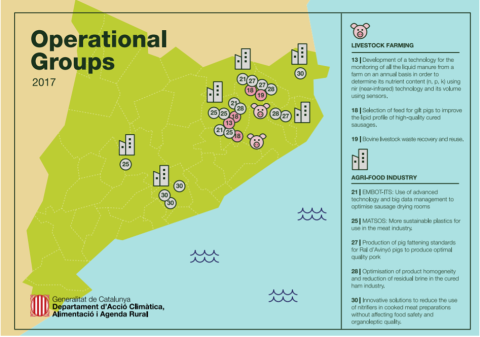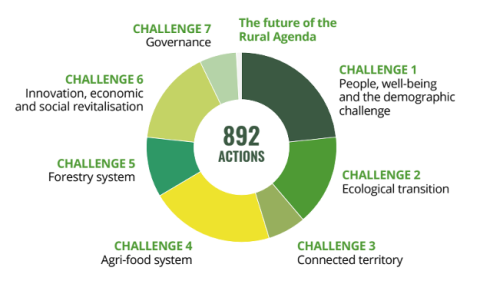Fostering rural innovation ecosystems: inspiring examples from Catalonia

In the face of societal challenges, such as youth emigration, aging population, social exclusion, and the transformative shifts in the agri-food and traditional industrial sectors towards the green and digital twin transitions, innovation becomes the cornerstone for peripheral rural areas (European Commission).
One promising avenue to drive innovation in rural areas is to establish new governance arrangements within an innovation ecosystem framework.
This approach has been pursued by the Catalonia government in Spain, which is offering valuable insights and good practices from Interreg Europe projects ORIGINN and TRINNO.
These practices can serve as inspiration for other regional policymakers in peripheral rural areas seeking to foster rural innovation ecosystems.
Catalonia, a region known for its thriving metropolitan centre, Barcelona, is also home to a myriad of rural areas, including 336 municipalities with fewer than 500 inhabitants. Although spanning 35% of the region’s territory, these areas comprise merely 1% of the population. The Rural Agenda for Catalonia, a comprehensive policy framework aimed at achieving balance and cohesion, has outlined 892 actions to address seven significant challenges.
Leveraging governance based on smart specialization strategy (S3) principles has proven to be a strong catalyst for transformative change and the cultivation of rural innovation ecosystems. Take, for example, Berguedà, a rural county with 40,000 inhabitants nestled in the north-central part of Catalonia. Here, the Berguedà development agency has spearheaded the region’s economic transformation by rallying quadruple helix actors.
Together, they have co-created and embraced innovative concepts, including support programs for rural entrepreneurship and the circular economy. This experience underscores the pivotal role of innovation governance structures in leading change through strategic agendas and fostering diverse partnerships.

Innovative governance arrangements further fortify rural innovation ecosystems, allowing experimentation and the development of place-based solutions for specific rural challenges. The Operational Group (OG) initiative, led by the Department of Climate Action, Food, and Rural Agenda under the Rural Development Programme in Catalonia, serves as a shining example of this strategy. These collaborative entities involve diverse organisations, including farms, agri-food and forestry companies, universities, and research centres.
Their mission? To address sectoral and territorial challenges through the creation of innovative pilot projects. Since 2015, six calls with a budget of €30 million have funded 293 projects, benefiting 783 people. OG not only facilitates university-industry collaboration but also embodies a bottom-up approach, empowering local actors to address place-based challenges.
Mònica Ysanda from the Generalitat de Catalunya highlights the necessity of bridging the gap between research and innovation in the agri-food sector. She emphasises the importance of forming partnerships between agriculture and research, combining existing knowledge with industry needs. She also recommends that regions offer robust support, clear instructions, and regular follow-up meetings with beneficiaries to ensure the success of such initiatives.
Another pioneering approach to catalyse transformative changes in rural Catalonia is the Shared Agenda of Lleida, the Pyrenees, and Aran, which focuses on developing the circular bioeconomy. One of the flagship initiatives under the Shared Agenda is BIOHUB Cat, which aims to create a bioeconomy hub by leveraging synergies between regional, national, and EU funds, such as the European Regional Development Fund (ERDF) and Horizon Europe.
For a more in-depth exploration, read our latest policy brief on regional missions.

